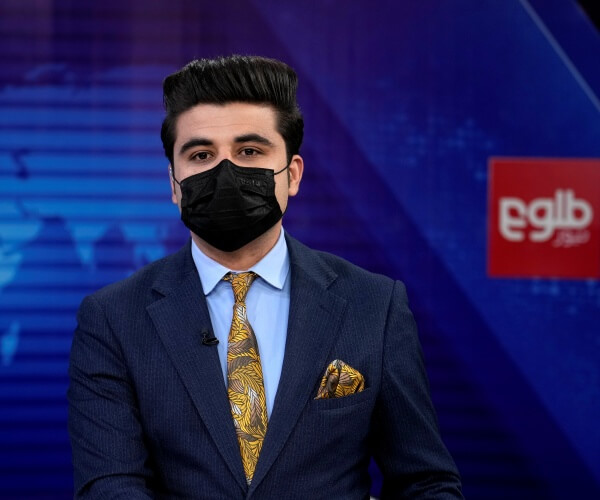Male television presenters at multiple news outlets in Afghanistan are protesting the Taliban’s decree that women cover their faces in public by covering their own faces with masks, Human Rights Watch reports.
Their act of solidarity launched the social media campaign #FreeHerFace, where others have posted pictures of themselves with their faces covered.
“Afghan men showing up for Afghan women is not just a gesture,” women’s rights activist Mina Sharif tweeted. “It's a turn in the story that will change everything. Bravo brothers.”
Two weeks ago, the Taliban ordered that women and girls must veil their faces in public and avoid being outside at all. Punishment for failing to comply would be inflicted on their male family members.
The Hill reports that the Taliban’s Ministry of Vice and Virtue ordered all women television presenters to cover their faces on Thursday, stating that “the decision was final and that there was no room for discussion.”
When the rule was first announced, it was largely ignored by female broadcasters. However, according to The Hill, by Sunday the new policy seemed to be in effect.
In addition to violating “women’s rights to freedom of expression, as well as personal autonomy and religious belief,” the rule will also “prevent access to information for people who are deaf or hard of hearing who lip read or rely on visual speech cues to help them understand people speaking,” Human Rights Watch Women’s Rights Associate Director Heather Barr and researcher Sahar Fetrat wrote of the decision.
Ziauddin Yousafzai, the father of Pakistani education activist Malala Yousafzai, posted to the #FreeHerFace campaign Monday.
“Day 249, faces are windows to our souls and personalities,” Yousafzai wrote. “Our faces are our identities. It is our basic human right to show our identities. Also when girls are enrolled in schools they get an identity.”
Malala Yousafzai became an international symbol of the fight for girls’ education after she was shot in the head in 2012 for opposing Taliban restrictions on female education in her home country of Pakistan. In December 2014, she became the youngest-ever Nobel Peace Prize laureate.
The Taliban have trampled many rights of women in Afghanistan since taking over Kabul in August, despite promises of a more tolerant regime.
Since coming to power, the radical group has blocked girls’ access to secondary education, barred women from most employment, hampered women’s freedom of movement, impeded women’s access to health care and eliminated systems intended to protect women from violence.









